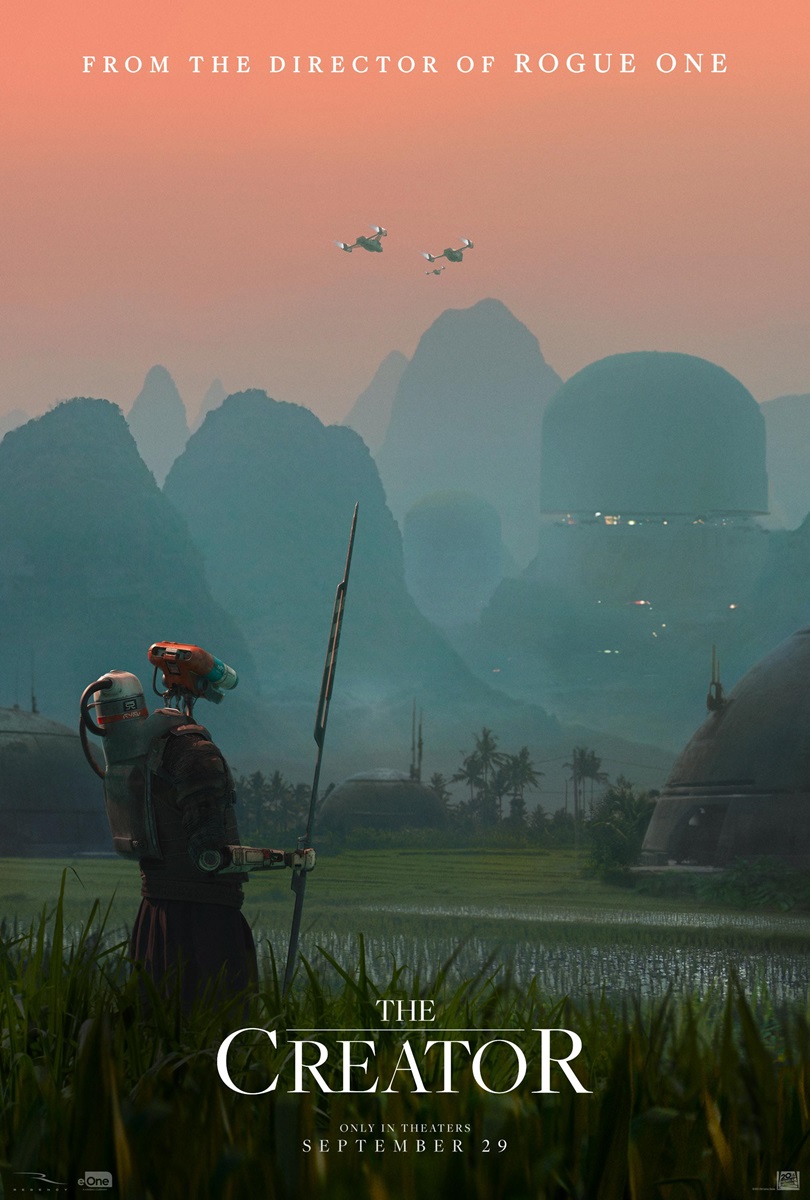
Let me preface by saying I saw this movie for free in the comfort of my home. I'd like to personally apologize for not honoring Original Art by seeing it in theaters, a true sign of the decline of Western Values. OK, you probably aren't really in on that joke - but there was a lot of discourse like this surrounding this movie online at the time it came out and didn't do so well in theaters. A bunch of people insisted that by refusing to see this you were demonstrating that no one valued new IPs or original content or creativity, stumbling instead into the blind, artistically failed Reboot and Remake Culture. But here is the problem: original, creative works can be good, or they can be bad. Derivative works can also be good, or they can be bad. If you want people to watch your original movie, you should probably make it good!
That's not say this movie has nothing good, and I can certainly imagine someone thinking this movie was good. I think it's okay. It does have great visuals; after watching Rebel Moon and then this in quick succession, it's rather stark how much better the sense of place is in this one, and it really does look nice and also like a believable slightly idealized future. It is an achievement also to not have the robot characters feel like they've been pasted in, but instead feel like they are mostly actually present. Many greenscreen movies can't even do this with real characters these days. Is that enough to make a movie good? No, but it's a start.
The narrative does not really hold up its end of the bargain, though. I was going to write up a section about how wildly heavy-handed it is in a lot of ways - sorry for the spoiler here, but having your AI superweapon be a little girl who is also the Buddha is not very subtle. But then I remembered that I like the Matrix movies and Xeno games, so perhaps I should be more forgiving. The way the movie leans so heavily into eastern religions is somewhat interesting but it is also the sort of shallow made-for-western-mainstream-audiences approach you might expect from it. It doesn't really detract, but it doesn't do anything particularly interesting with it either. It is more the aesthetics of Buddhism than anything else, I think. But I'm not a religious scholar, and maybe there's a bunch of symbolism and philosophical meanings I am missing. None of this is really the problem either; it's that it's ultimately kind of just flat and boring and gets a bit lost in its own metaphor.
I accidentally read part of a review of this movie, once, and a line stuck out to me so I looked it up again: "Edwards pushes the relatable ordinariness of the androids and hybrid 'simulants', but the potential menace of A. I. inescapably looms over the movie's head." This reading is so funny to me, because that "menace" absolutely does not "loom" over the movie. In fact, if you think that, you've totally missed the point! This fake version of AI, which doesn't exist in the real world but is a devastating threat to humans on an existential level, also doesn't exist in the movie world, but the idea of it is used as a lever to engineer a campaign of death. Please, I am begging AI Tech Bros, stop pretending that ChatGPT is an AI at all to begin with, and then stop pretending that an AI would somehow magically harbor a desire to kill all humans for no reason, while also pretending it would simultaneously harbor no desire to help and protect humans. You can't have it both ways. Unless you're just fearmongering for profit, something that capitalism would obviously never incentivize.
Another irony of this whole stance above is that the AI in the movie is not really about AI at all - it is a very old school science fiction style in some sense, where the simulants are truly just a very literal stand-in for the metaphor about oppressed people. It is about creating outgroups and ingroups based on arbitrary distinctions and enforcing those through all the standard tools used to do so, and how love is a primary tool to allow people to overcome their ingrained hatred of the Other. In classic Science Fiction it's pretty common to have this kind of very direct metaphor but in modern Science Fiction it a bit less common and more normal to have something like this be, for example, either more about the nature of AI itself or more just a Cool Story.
The actual strength of the metaphor in this movie has some hits and some misses; the US imperial war machine bombing small foreign countries full of brown people just trying to go about their own business while speaking Vietnamese is a little on the nose, sure. But it does some clever things - for example, the refrain repeated a few times by the Americans in situations where they're having their "are we the baddies?" moments is "it's not real, it's just programming." The characters are talking about the simulants being fully programmed, but the movie is talking about those same characters programming themselves with this kind of thought-terminating cliche, and it's clearly intentional and while not amazingly deep it is a clever use of the language and a reminder of the ways in which humans program themselves to behave in certain ways. The metaphor is probably a bit undermined in real-world terms by having the simulants be such a Perfect Victim; they never do anything at all that might complicate them or implicate them, in a way that real world people wouldn't and can't, and it allows a bit of an escape hatch in transferring the idea to real-world victims.
Ultimately, I'm just happy for all the simulants that the big evil warship blew up at the end, ending prejudice against them forever.
Score: 5/10
IMDb: The Creator
PS: Pretty sure he made this movie because he fell in love with his own sassy robot girlfriend from Rogue One. Too bad these ones weren't sassy or funny like K-2.
PPS: If I were a simulant, I would not put an off switch on the outside of my head that anyone could simply walk up to and turn off. I mean, if I was designing a robot I wouldn't make it so that a single bullet could somehow totally destroy it irrevocably, either, but I guess they aren't very good at these things.
PPPS: Downright Snyderian subtlety in having the main character in the "war between humans and simulants" be half-human and half-machine. Can we get the antlered robot from Rebel Moon in on this action? Maybe leaping with a spear at something with ten lens flares behind it?
PPPPS: Subtext is for cowards.
